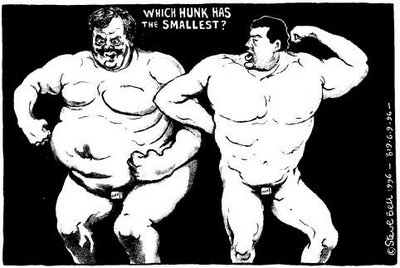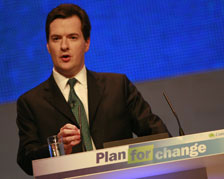A welcome back to Ken Clarke.
 Probably the most astonishing thing about the last few months politically has been one of the things that has been barely touched on: just how badly the Conservatives have been doing when they should be, by rights, decimating Labour in the polls and potentially getting ready for government. By badly we have to keep things in perspective: at no point has Labour actually regained the lead in the opinion polls, although it has come strikingly close to it in some. Looking back historically however, Labour after the 92 election consistently led the Conservatives in the polls, sometimes by ludicrous figures of 25%+. The Conservatives for a while managed comparable figures in the middle of last year, before the second Brown bounce after the bail out took full effect.
Probably the most astonishing thing about the last few months politically has been one of the things that has been barely touched on: just how badly the Conservatives have been doing when they should be, by rights, decimating Labour in the polls and potentially getting ready for government. By badly we have to keep things in perspective: at no point has Labour actually regained the lead in the opinion polls, although it has come strikingly close to it in some. Looking back historically however, Labour after the 92 election consistently led the Conservatives in the polls, sometimes by ludicrous figures of 25%+. The Conservatives for a while managed comparable figures in the middle of last year, before the second Brown bounce after the bail out took full effect.Things have since improved, the gloom of January, the ever rising toll of job losses, and now increasingly the beleaguered nature of both Brown and Darling, no longer looking like they know what they're doing, or rather at least not radiating the confidence which infected the former during the initial stages of the banking crisis, all coming into effect.
Less immediate will be the impact of the bringing back of Ken Clarke, a move long mooted and encouraged but which still seemed unlikely. Looking at the Conservative front bench today, excepting Clarke, it was impossible not to see a group of grey men, one which you'd find it difficult to have any confidence in. The wider Conservative reshuffle, and Cameron's strange refusal to bring back the irascible David Davis, still apparently smarting from his decision to resign and fight for a principle, said much the same: for all the boasts that Cameron's shadow cabinet now contains more women than Brown's, all, except for perhaps Theresa May, moved to Shadow Work and Pensions, are in the jobs which rarely result in them appearing on our screens. Similarly mystifying was the move of Chris Grayling, a true grey, underwhelming man if ever there was one, to shadow home secretary. When we have a government which is so apparently wedded to the casual dilution, even evaporation of our civil liberties, you want someone in the seat opposite to have something approaching credentials for fighting against such policies. Say what you will about Davis's support for capital punishment and hard-line approach to immigration, you knew where he stood on ID cards, 42 days and everything in-between. His first replacement Dominic Grieve, moved back to his former job as shadow justice secretary, was never likely to live up to Davis's success in outliving, even bringing down consecutive home secretaries, but apart from his supposed libertarian leanings he made truly abysmal speeches and comments on the Human Rights Act and came across as having been promoted above his competence.
All the immediate comparisons regarding Clarke's re-entry to the shadow cabinet were to Brown's far more surprising offering of a job to Mandelson, to whom Clarke will shadow, but to compare the two any further than that is more than a disservice to Ken. Both might be widely disliked amongst the parties' respective core supporters, but Clarke is lovable, affable and endearing when Mandelson is a person you suspect only a mother could truly love. Doubtless that is part of the reason why Mandelson succeeded in most of what he did outside of his resignations; even those that loathed him seem to have a grudging respect. Clarke on the other hand has always been, along with Alan Duncan, regardless of his involvement with Vitoil, the "acceptable" Conservative, the ones that don't instantly set your teeth on edge. Compared to George Osborne, supposedly having lessons in how not to make people resort to violence on hearing or seeing him, there simply isn't a contest. It helps also that as Cameron retorted at PMQs today, he has something of a shining record as the last Conservative chancellor.
It might well have been coincidence, but today was also the first PMQs for quite some time when Cameron comprehensively scored a victory. Brown was so desperate to change the subject away from the economy that he brought up the completely irrelevant fact of Clarke's differences with most of his Tory colleagues on Europe, when surely more damaging would have been Clarke's also apparent agreement with Brown on the need for a stimulus, that the VAT cut wasn't completely idiotic or a "bombshell" as the Conservatives portrayed it, and that anyone going into the next election promising tax cuts was asking for trouble. For someone who appeared to be finally getting better at the dispatch box, it was embarrassing, and the silence on the Labour benches was eerily apparent.
When criticising Conservative politicians you can't of course ignore the fact that there are much the same problems on the Labour benches, with the added disadvantage that these less than promising individuals are actually in power. The only consolation is that we know the Conservatives would introduce even more swingeing reforms of benefits than James Purnell is proposing; there is however no one quite as pompous or over-promoted on the opposite side as Geoff "Buff" Hoon, and that only Harriet Harman could possibly be so utterly stupid as to try to block freedom of information requests on MP's spending in the current economic situation. Not that the Tory shadows would be much better in the same jobs, and indeed, the idea of George Osborne being chancellor is terrifying in the extreme. Likewise, Eric Pickles, the new party chairman, who is doubtless very popular with the Tory grassroots, seems such a throwback to Thatcherite days that he appears to have the exact same bulk as the pre-diet Nigel Lawson.
The bringing back of Clarke bears further comparison to Brown's strategy for a further reason: while Brown has been apparently desperate to put back together the original New Labour coalition, sans Blair, with the equally dislikable Alan Milburn also brought back into the fold, Clarke is from an even earlier era. The difference is that his stretches in Thatcher's government, and spell as, however humourously aesthetically, health secretary, have been all but forgotten. We instead remember him as chancellor, as the successive leadership challenger that could have restored the Tories' fortunes earlier if only he could have closed the chasm between himself and the rest of the party over Europe. Mandelson and the rest just remind us, quite rightly, of spin and the decadence now in retrospect of the early New Labour years. He might well be, as Lord Tebbit characterised him, lazy, but his laziness might just be the thing that convinces those uncertain of the economics of Osborne that there is something of substance there after all.
Labels: Chris Grayling, Conservatives, death of Labour, Dominic Grieve, Gordon Brown, Kenneth Clarke, politics, reshuffles


